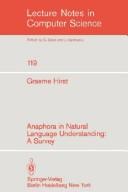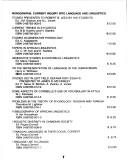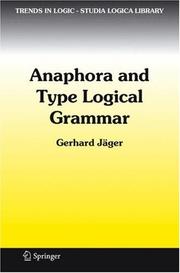| Listing 1 - 10 of 94 | << page >> |
Sort by
|
Book
Year: 1987 Publisher: Genève Droz
Abstract | Keywords | Export | Availability | Bookmark
 Loading...
Loading...Choose an application
- Reference Manager
- EndNote
- RefWorks (Direct export to RefWorks)

ISBN: 0387108580 Year: 1981 Publisher: Berlin ; New York : Springer-Verlag,
Abstract | Keywords | Export | Availability | Bookmark
 Loading...
Loading...Choose an application
- Reference Manager
- EndNote
- RefWorks (Direct export to RefWorks)

ISBN: 0887830250 Year: 1978 Publisher: Edmonton Linguistic research
Abstract | Keywords | Export | Availability | Bookmark
 Loading...
Loading...Choose an application
- Reference Manager
- EndNote
- RefWorks (Direct export to RefWorks)
Book
ISBN: 9789027249326 9027249326 9789027214294 Year: 2023 Publisher: Amsterdam John Benjamins Publishing Company
Abstract | Keywords | Export | Availability | Bookmark
 Loading...
Loading...Choose an application
- Reference Manager
- EndNote
- RefWorks (Direct export to RefWorks)
"The thematic volume 'Individual differences in anaphora resolution: Language and cognitive effects' was initially inspired by a workshop on anaphora organized by the 'Language Development Lab', School of English, Aristotle University and hosted in Thessaloniki in May 2015. 'Individual differences in anaphora resolution: Language and cognitive effects' explores anaphora resolution from different perspectives, and investigates various aspects of the phenomenon, as contributions include research protocols that combine old and new experimental methodologies as well as theoretical and empirical approaches. A central theme across volume contributions are the multiple linguistic and extralinguistic factors that constrain anaphora resolution, its processing and acquisition by a variety of populations (children and adults, monolinguals, bilinguals and second language learners) as well as the mechanisms underlying anaphora resolution. Anaphora resolution constitutes an ideal environment to test the interaction between domain-general cognitive systems and domain-specific linguistic sub-routines, since variability in referential preferences is not related to binding constraints (an integral part of syntax per se) but is closely tied to processing (functional constraints) modulated by the integration of discourse-filtered information"--
Book
ISBN: 0709942982 9780709942986 Year: 1987 Publisher: London: Croom Helm,
Abstract | Keywords | Export | Availability | Bookmark
 Loading...
Loading...Choose an application
- Reference Manager
- EndNote
- RefWorks (Direct export to RefWorks)
Grammar, Comparative and general --- Semantics --- Anaphora (Linguistics)
Book
Year: 1981 Publisher: Lund: Slaviska institutionen vid Lunds Universitet,
Abstract | Keywords | Export | Availability | Bookmark
 Loading...
Loading...Choose an application
- Reference Manager
- EndNote
- RefWorks (Direct export to RefWorks)
Anaphora (Linguistics) --- Grammar, Comparative and general --- Slavic languages --- Slavic languages

ISBN: 1402039042 Year: 2005 Publisher: Dordrecht : Springer,
Abstract | Keywords | Export | Availability | Bookmark
 Loading...
Loading...Choose an application
- Reference Manager
- EndNote
- RefWorks (Direct export to RefWorks)
Book
ISBN: 0226709558 Year: 1984 Publisher: Chicago : University of Chicago Press,
Abstract | Keywords | Export | Availability | Bookmark
 Loading...
Loading...Choose an application
- Reference Manager
- EndNote
- RefWorks (Direct export to RefWorks)
Anaphora (Linguistics). --- Grammar, Comparative and general --- Semantics. --- Syntax.
Book
ISBN: 9004648836 Year: 2023 Publisher: Leiden : Brill Academic Publishers,
Abstract | Keywords | Export | Availability | Bookmark
 Loading...
Loading...Choose an application
- Reference Manager
- EndNote
- RefWorks (Direct export to RefWorks)
L'anaphore est à la mode : il suffit de considérer le nombre d'études qu'on publie les derniers temps sur le sujet pour s'en convaincre. Par rapport à ce flot de publications, les études réunies dans ce recueil ont pour particularité de s'intéresser au rapport qu'entretient l'anaphore non pas avec la cohérence, mais avec l'incohérence. La première série d'études s'intéresse au pronom il lorsque celui-ci est employé pour désigner des référents en transformation (les référents évolutifs) ou pour marquer l'hétérogénéité discursive et les changements d'univers de croyance associés, et pose le problème de la notion de focalisation. La deuxième série concerne l'emploi anaphorique des syntagmes nominaux définis, dont le statut anaphorique même est remis en question. Leur interprétation est en effet plutôt indirecte, puisqu'elle exige la récupération d'un cadre. L'accessibilité de celui-ci dépend de facteurs cognitifs et argumentatifs. Les syntagmes sans nom et les syntagmes nominaux démonstratifs posent des problèmes particuliers à cet égard. La dernière série d'analyses porte sur les mécanismes anaphoriques qui sous-tendent les indéfinis (pronoms et adjectifs) même, autre, et tel, qui ont chacun leur fonctionnement anaphorique propre et qui imposent chacun des contraintes spécifiques sur les inférences nécessaires pour récupérer le contexte qui permet de les interpréter. Ce qui pose la question de la définition même de l'anaphore. Faut-il élargir la notion et considérer comme anaphoriques des phénomènes comme le redoublement clitique en bulgare? Ou faut-il au contraire la restreindre et distinguer l'anaphore d'autres types de relations (en l'occurrence la relativisation ou les rapports corrélatifs)? En dernière analyse, une réponse à ses questions engage la notion de cohérence. This volume is a collection of studies on pronominal and nominal anaphoric expressions. The central question of the volume is how anaphoric expressions contribute to the creation of textual coherence or, even, incoherence. It covers a range of French expressions, from pronomina as such to adjectives such as tel and même as well as nominal expressions. Specific types of anaphora studied include associative and evolutive anaphora, as well as the more formal semantic representation of anaphora. The volume thus finally poses the more general problem of the definition of anaphora as such and its relation with coherence more in particular.
Anaphora (Linguistics) --- Grammar, Comparative and general --- Relative clauses. --- Syntax.
Book
Year: 1997 Publisher: Amsterdam ; Atlanta, GA ; Rodopi,
Abstract | Keywords | Export | Availability | Bookmark
 Loading...
Loading...Choose an application
- Reference Manager
- EndNote
- RefWorks (Direct export to RefWorks)
Anaphora (Linguistics) --- Grammar, Comparative and general --- Semantics. --- Relative clause. --- Syntax.
| Listing 1 - 10 of 94 | << page >> |
Sort by
|

 Search
Search Feedback
Feedback About UniCat
About UniCat  Help
Help News
News